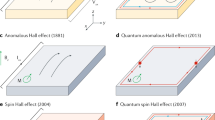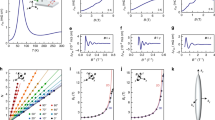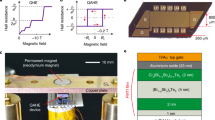Abstract
THE Hall effect of the so-called electronic semiconductors is usually found to be comparatively very large. All the semiconductors investigated up to the present time obey this rule, with the exception of lead sulphide (PbS), for which the experimental data vary from one sample to another. For example, according to van Aubel1 and Heaps,2 chemically pure lead sulphide has a very small Hall coefficient, while the Hall constant of the natural lead sulphide (galena) may (according to investigations by A. Smith3 and Heaps2 reach values as large as 254.
This is a preview of subscription content, access via your institution
Access options
Subscribe to this journal
Receive 51 print issues and online access
$199.00 per year
only $3.90 per issue
Buy this article
- Purchase on Springer Link
- Instant access to full article PDF
Prices may be subject to local taxes which are calculated during checkout
Similar content being viewed by others
References
Phys. Zeit., 4, 551; 1913.
Phil. Mag., 6, 1283; 1928.
Phys. Rev. (2), 1, 339; 1913.
Meissner, Zeit. für Phys., 58, 570; 1930.
K. Fischbeck und O. Dorner, Zeit. für anorg. und alg. Chemie, 181, 372: 1929.
Author information
Authors and Affiliations
Rights and permissions
About this article
Cite this article
KIKOIN, I., LASAREW, B. Hall Effect and Superconductivity. Nature 129, 57–58 (1932). https://doi.org/10.1038/129057b0
Issue Date:
DOI: https://doi.org/10.1038/129057b0
This article is cited by
-
Supraconductivity and the Hall Effect
Nature (1934)
Comments
By submitting a comment you agree to abide by our Terms and Community Guidelines. If you find something abusive or that does not comply with our terms or guidelines please flag it as inappropriate.



